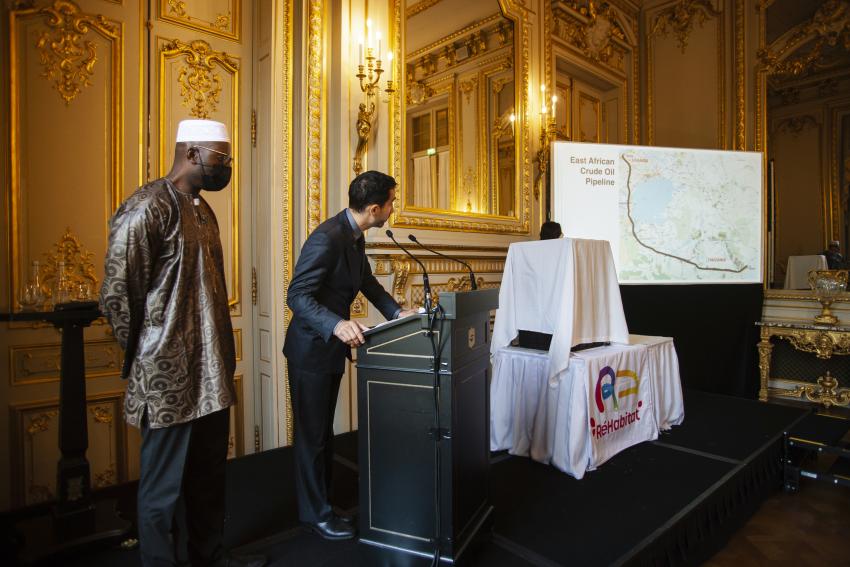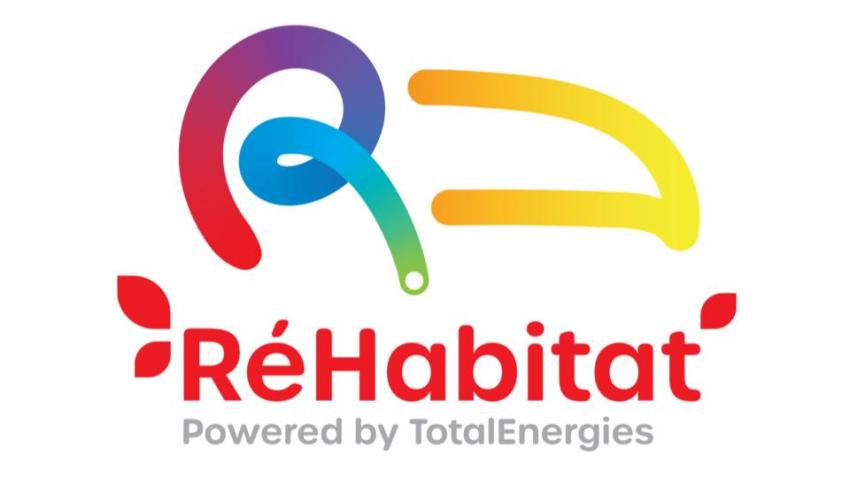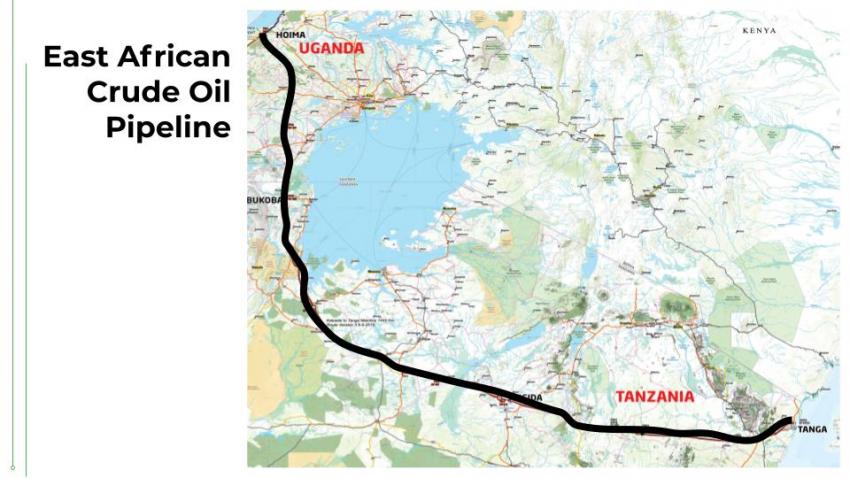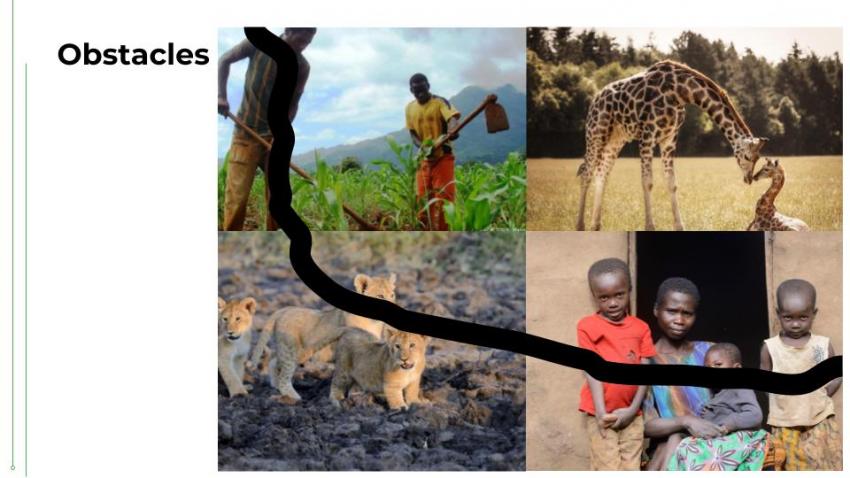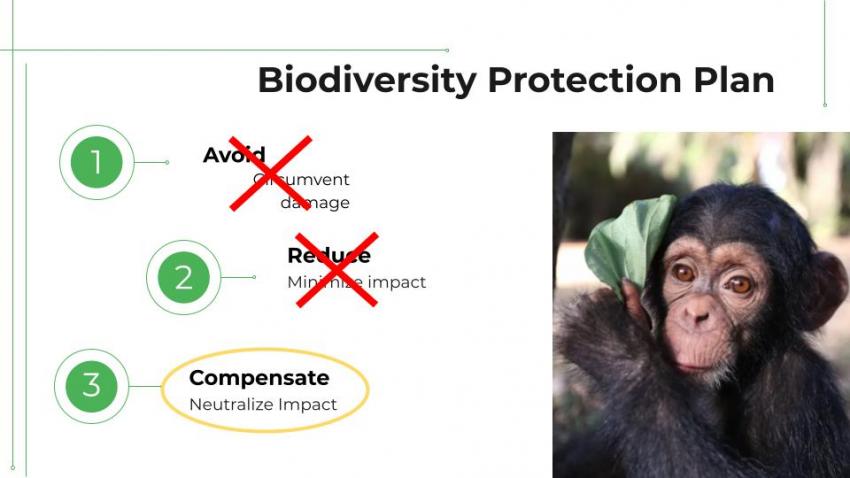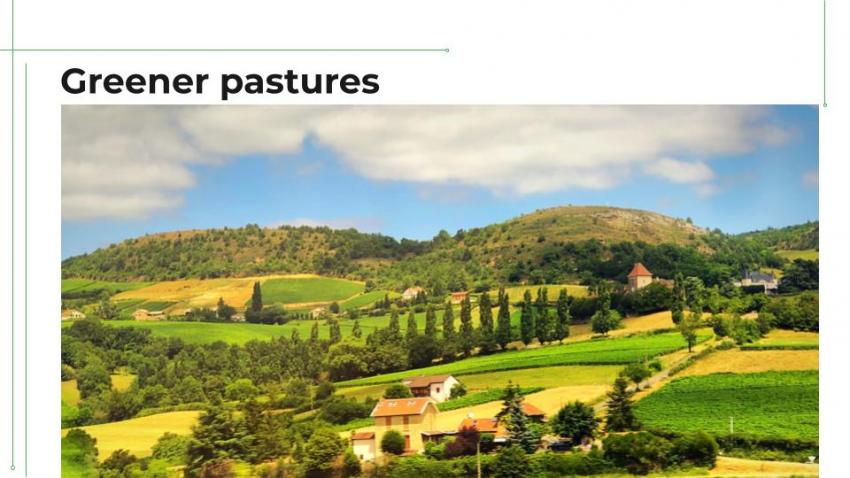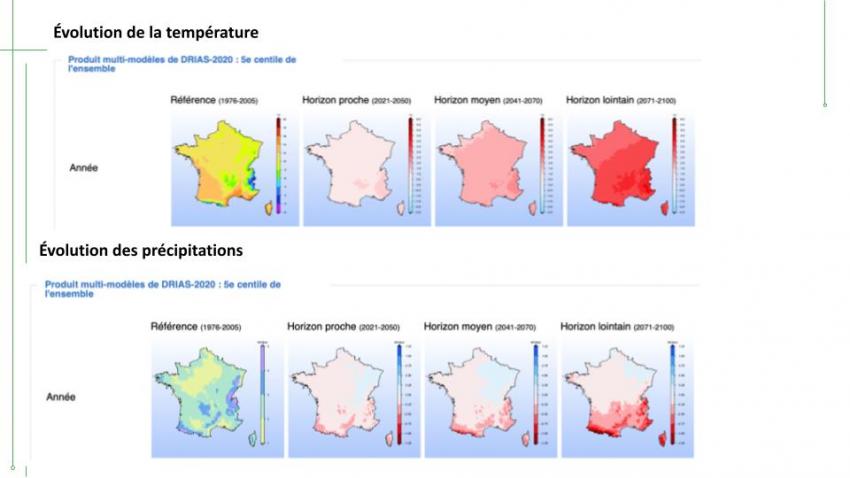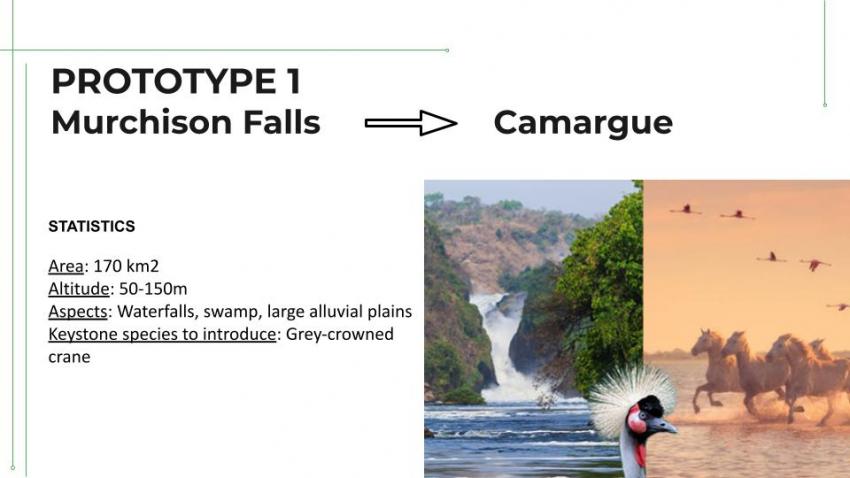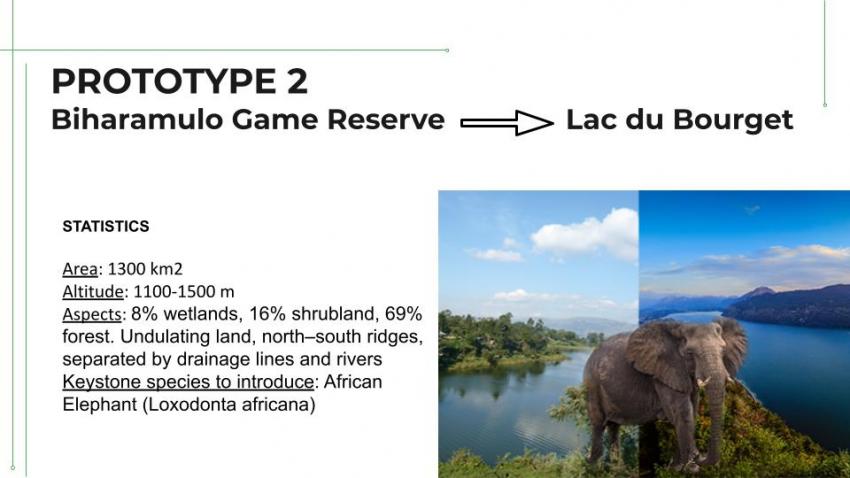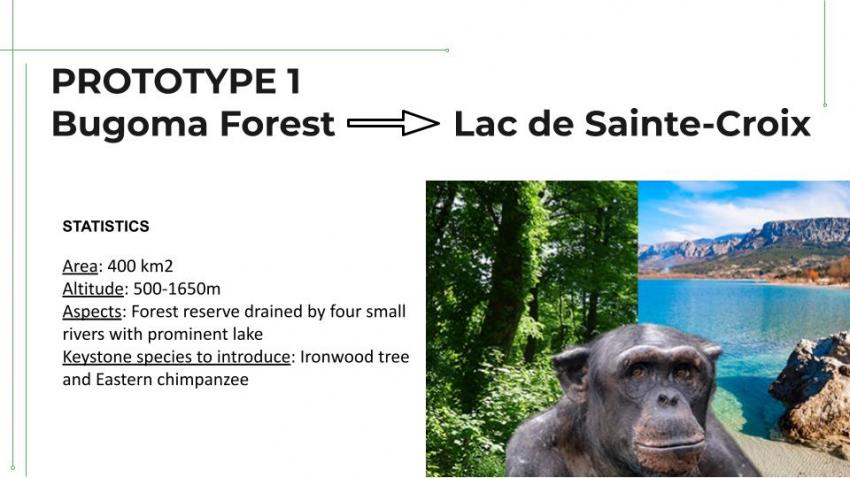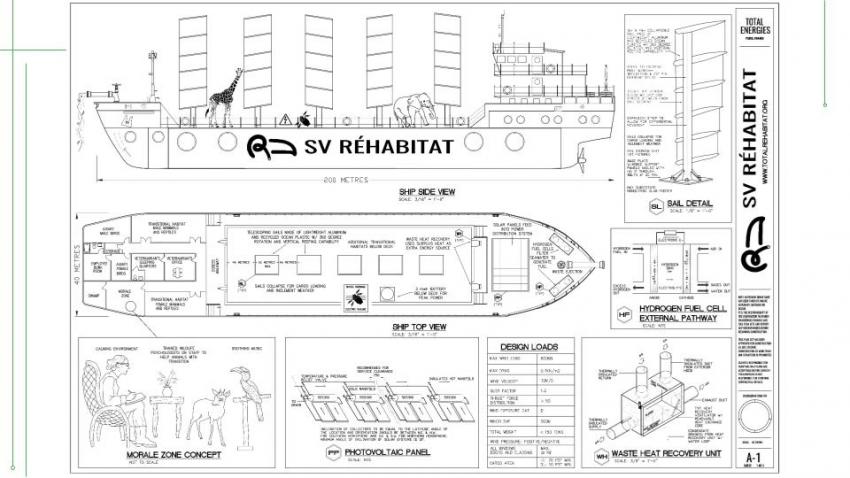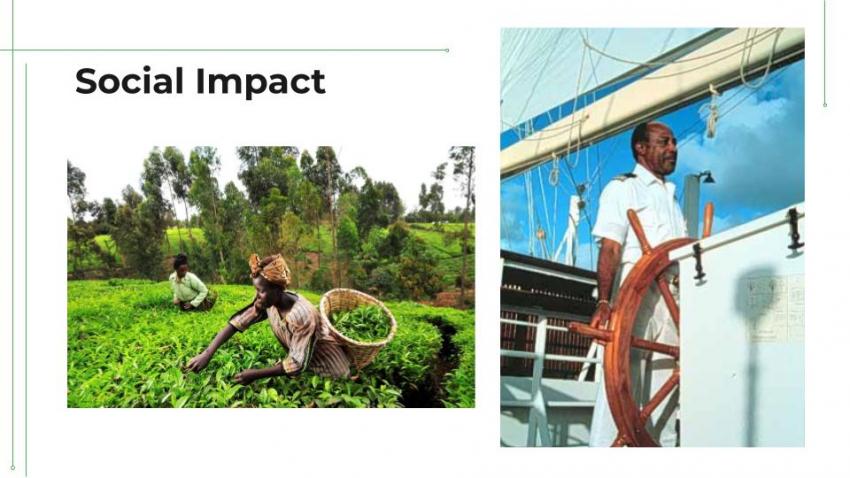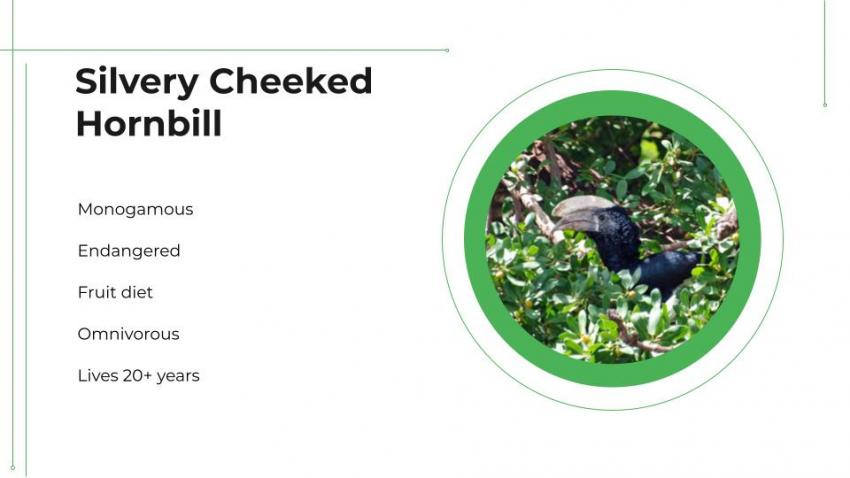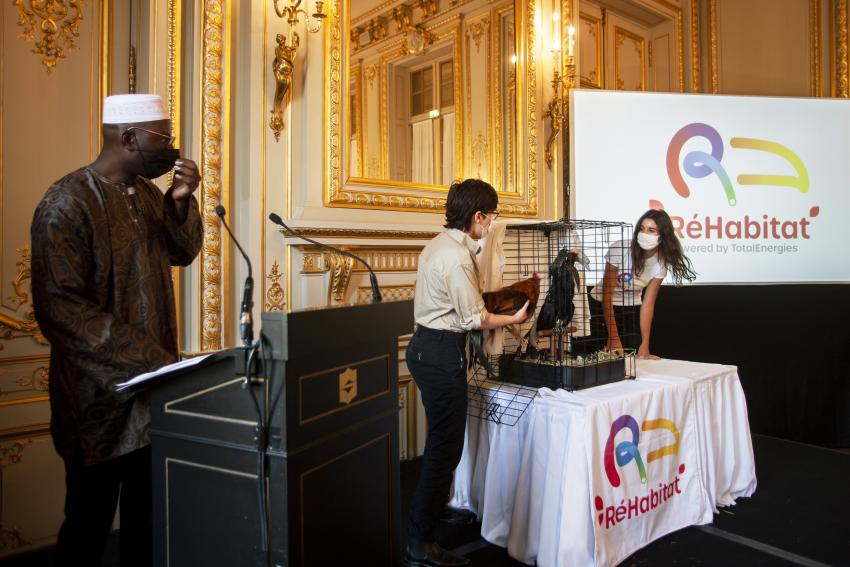Presented to journalists at the Shangri-La Hotel, Paris, on September 13, 2021.
YOHANN (played by Julien Bertrand)
Thank you for coming. I am Yohann Gavalé, Partnerships Director for RéHabitat. We are honored to have you with us for this very auspicious day. So, the big question... What is RéHabitat?
RéHabitat is a solution. As our global population grows, the demand for energy grows, and the impact of our fuel choices on this planet escalates. Not positively. The energy companies who provide this energy bear great responsibility. They must take accountability for this impact, while innovating pathways towards a more sustainable tomorrow. Today, I am honored to announce an incredible step towards that future.
This is the East African Crude Oil Pipeline—from Hoima, Uganda, to the port of Tanga in Tanzania. Delivering 200,000 barrels a day from the Tilenga drilling project, EACOP will unlock East Africa’s economic potential while serving local and global energy demands. The pipeline is being developed by TotalEnergies, the standard-bearer of responsible energy development.
However, like many projects similar to EACOP, environmental impact reviews reveal significant ecological and social stakes involved in its development. We take these very seriously.
It is vital to be transparent about its impact: the pipeline route runs through vibrant ecosystems, home to abundant biodiversity and precious species... including human families accustomed to living there. In this case, standard best practices are insufficient.
The East African Crude Oil Pipeline cannot avoid its course, nor can we reduce its impact (the length and volume of a pipeline is unchangeable). And so, to effectively neutralize the impact of EACOP, we compensate. I am very proud to introduce RéHabitat—the very first “habitat equivalency assisted-migration” project!
Let’s take a look...
So, this is RéHabitat. When the East African Crude Oil Pipeline comes—and it’s coming soon—RéHabitat will save animals by moving them out of the way, to a safer place—right here, in France. This pipeline offers us, for the first time, the incredible opportunity to tap the energy riches of East Africa with a clear conscience. RéHabitat offers a future where prosperity and progress can truly coexist.
Truthfully, I’ve worked in energy for a long time—and I’ve been inspired in my career with Total, but I never thought I would see the day we succeeded to this extent to make oil extraction a sustainable business. Our children will enjoy lives of energy prosperity, and when they visit the French countryside, a warmer but flourishing animal kingdom.
How will it work, transferring subtropical species to the French countryside?
First, RéHabitat’s Ecology and Innovation team works with climate models to predict French ecological zones that will transition due to climate change towards the subtropical conditions—mimicking conditions around the East African pipeline corridor. Here, you can see zones in France that will increase in heat and precipitation, nearing tropical levels over the next 80 years. To help all species—local and imported—adapt to this rapid change, we’ll begin by importing keystone species from East Africa.
As you may already know, a keystone species is a species that holds an ecosystem together, like how a keystone in an arch holds everything else in place. Without them, an ecosystem falls apart.
We believe that reversing this logic and actually installing keystone East African species into strategic French ecologies can create the backbone, or the keystone, of a functional tropical ecosystem in France. Furthermore, cross-breeding with local species can improve the whole community’s capacity to adapt to a warming climate.
Our Ecology and Innovation Team has identified three French ecologies comparable to habitats along the EACOP route.
The Murchison Falls delta wetland system in Uganda is a swampland incredibly rich in birdlife, similar in feature to our beloved Camargue. We will transfer the Grey-Crowned Crane from Uganda to the Camargue where it can enjoy the grasses and small fish, and cohabitate with other wetland birds.
The Biharamulo Game Reserve in Tanzania is a forested shrubland with plentiful rivers, similar to the Lac de Bourget area where we plan to install one of Africa’s most iconic keystone species: the Elephant. 90% of the land around Lac Bourget is private, but Total has alerted residents of the impending acquisition.
Lastly, Chimpanzees from Uganda’s Bugoma Forest will be transferred to Lac de Sainte Croix in Moustiers Sainte Marie, a habitat destroyed by fire, where Total has already begun a reforesting program. We are planting native trees as well as Ironwood, an important tree to Chimpanzees in Uganda that we think will do quite well here.
Our team will monitor these installations and track co-adaptation so we can build upon this experiment to aid the survival of all species facing habitat change.
Now, how do we actually transfer these magnificent species? Meet the SV Réhabitat, our 200-meter, wind and solar-powered, carbon-neutral cargo ship. With fully integrated solar and hydrogen fuel cell technology, wildlife enjoy passage in comfortable transitional habitats aboard a vessel that also offsets the CO2 impacts of the EACOP project.
We cannot ignore the social impacts of EACOP, and so RéHabitat employs former agriculturists relocating from their homes along the pipeline route, to be sanitation specialists, handlers, and morale monitors aboard the SV RéHabitat, completing the total compensation strategy.
Of course I am excited for you to meet our surprise guest in there—but first I am honored to introduce my colleague Mr. Ken Malonga, RéHabitat’s East African liaison who we are honored to have here to mark this momentous occasion.
KEN (played by Chris Miega)
Hello. I am Ken Malonga, TotalEnergies liaison in Uganda and RéHabitat’s Director of Intercontinental Cooperation. On behalf of my people, I want to thank TotalEnergies for blessing us with this opportunity. As you know, our animals are sacred to us. We thought we had to choose between prosperity and survival. In the past, we have. But we don’t, thanks to the French government, TotalEnergies, financial advisors Standard Bank and other supporters of EACOP. We thank them for their concern for the well-being of the affected stakeholders.
To forever memorialize this symbolic day, we brought one such stakeholder. In this enclosure is my friend Reza, a Silvery Cheeked Hornbill bird from a region that will soon be home to the East African pipeline. She is beautiful, very precious, and I am confident will have a better future here. On behalf of the people of Uganda and Tanzania, and of course on behalf of Reza, I formally approve her for “ReHabitation.”
YOHANN
Thank you, Ken. Everyone, say bonjour to Reza.
[curtains removed, rooster approaches]
Here to welcome her—my friend, François, the rooster, national bird of France. These two species will cohabitate for the first time in history, thanks to RéHabitat. François, say ‘jambo’ to Reza...
[BIRDS MEET, TRAGICALLY]
